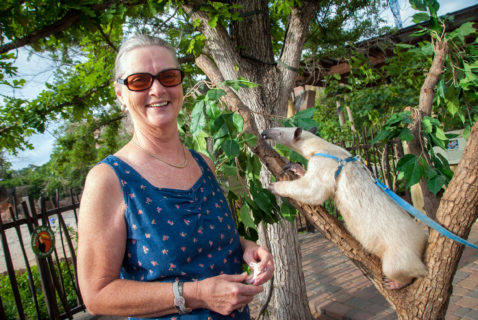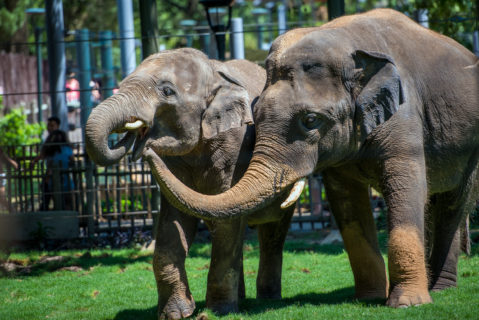Long-Time Volunteer Leaves Legacy That Helps Elephants
“Dulane was an amazing part of this team for years,” Daryl Hoffman, curator of large mammals, said. “She was always there for us. She was always the first to volunteer. When there was anything you needed done, she was there, and she was super awesome to have around.”
 In 2018, Dulane Myrtle Bourdeau, long-time volunteer at the Houston Zoo, passed away. After years of dedicated service, Dulane chose to leave a majority of her estate to our Zoo. Her legacy gift will support the elephant herd she loved. We are so grateful for this meaningful gift and for Dulane’s dedication to our elephant family. Our Development Department works with any animal lover who wants to make a significant impact by leaving a legacy gift to support our Zoo.
In 2018, Dulane Myrtle Bourdeau, long-time volunteer at the Houston Zoo, passed away. After years of dedicated service, Dulane chose to leave a majority of her estate to our Zoo. Her legacy gift will support the elephant herd she loved. We are so grateful for this meaningful gift and for Dulane’s dedication to our elephant family. Our Development Department works with any animal lover who wants to make a significant impact by leaving a legacy gift to support our Zoo.
The John and Ingrid Werler Society is a group of steadfast donors who have made legacy gifts to our Zoo. Please contact the Development Department here to discuss how you can secure our organization’s future by leaving a personal legacy with a gift in your estate.
Nina Morrison-Jarrett, Dulane’s best friend, is happy to see her legacy gift in action. “We were very, very close,” Nina said. “We had a firm friendship that lasted 54 years and included many visits to see the ‘herd’. Dulane would be happy knowing her gift will continue the work she had done for so long as a volunteer.”
Volunteers within the elephant department are responsible for numerous duties, all of which Dulane was happy to take on. From cleaning the yard, to setting up enrichment, to staying overnight at birth-watches, volunteers’ help is crucial to the keepers.
“The biggest help is just cleaning up,” Daryl said. “Elephants are awesome, but they eat 165 – 300 pounds of food a day. Their digestive system is only about 45 percent efficient, which means we clean up about 55 percent of everything that goes in.”
Everything about taking care of our herd of 10 takes time and care. Keepers and volunteers use enrichment like rearranging the yard to recreate a natural environment. In the wild, elephants travel great distances to find food and water. By mixing up their habitat, we make every day a bit different and are able to further engage their minds. Elephants are some of the most intelligent animals, and keepers encourage this by working with them to respond to cues.
 “I really like the interaction you get when you train and the relationship you build when you finally see that lightbulb come on and they get what you’re trying to say,” Daryl said. “Tupelo, for instance, is eager. You work with her one day, and then you come in the next day, about to give the cue you worked on the day before, and she does it. They think about you and the enrichment when you’re not there.”
“I really like the interaction you get when you train and the relationship you build when you finally see that lightbulb come on and they get what you’re trying to say,” Daryl said. “Tupelo, for instance, is eager. You work with her one day, and then you come in the next day, about to give the cue you worked on the day before, and she does it. They think about you and the enrichment when you’re not there.”
Keepers use cues to examine elephants to ensure they are happy and healthy. One of the things keepers routinely screen for is elephant endotheliotropic herpesvirus (EEHV), an often fatal disease. The Zoo’s testing methods, treatment protocols, and experience serve as a global elephant care resource and have contributed to saving elephant calves around the world.
The elephants develop close bonds with their keepers, and they know the volunteers well. It takes time for an elephant to build a trusting relationship, but once it’s there it’s unique and incredibly special.
“Dulane was there for so many of the elephants’ births,” Nina said. “They knew her. When we went to the Zoo, if Duncan and Baylor heard her voice, they both immediately came up to her.”
The connections made at our Zoo are special. Without our volunteers, and the support of every guest, we would not be have the opportunity to build these strong relationships between people and animals. We are incredibly grateful for all the support we receive that helps us inspire action to save wildlife.
For more information about how to make a gift in your estate to our Zoo or to let us know about a current legacy gift, please visit our Leave a Legacy website here.
